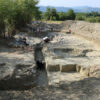Whether talking about the office kitchen, hiking trails or ratings on Yelp, there are always people who put in effort to leave those spaces better. There are also those who contribute nothing to that public good.
New research using large-scale online experiments suggests that rewarding people to contribute to a virtual public good, such as a simulated online rating for a ferry system, increased the accuracy of the ratings and improved the overall quality of that resource.
The multidisciplinary team, including researchers from the University of California, Davis; Hunter College, College of New York; the Max Planck Institute for Empirical Aesthetics; and Princeton University tested ideas about collective action in a simulation incorporating more than 500 people worldwide. Team expertise included communication science, sociology, computer science, psychology and animal behavior.
The study was published this week in the Proceedings of the National Academy of Sciences.
“When you have a collective action problem, you either want to prevent a bad thing from happening or you want to harness all this energy to make a good thing happen,” said Seth Frey, an assistant professor of communication at UC Davis and co-author of the paper. Frey studies collective action, or the science of creating systems that can maintain shared resources.
He said the study could have broader applications for online retailers’ rating systems. “What our results could mean for Amazon ratings, Yelp stars, or clothing retailers is that if those sites gave rewards for engaging in reviews, they would not only attract more product ratings, but more accurate ratings, which helps everyone.”
Riding ferries for coins
The team developed a 3D virtual world where online players enjoyed a limited amount of time to collect coins on tropical islands. In the game, ferries that took players from island to island all traveled at different speeds.
The game included a rating system so players could help each other choose the fastest ferry. Those ratings were shared among all players. Some participants rated most or all the ferries, contributing to the public good, while others hardly rated any, researchers said.
“You just have to learn over time by exploring and testing which ones are best,” said Nori Jacoby, a research group leader at the Max Planck Institute for Empirical Aesthetics and a co-author on the study. “We made that a collective effort by letting people leave ratings so other people can learn quickly which ferry would be their best choice.”
Improving a public good
The public good represented in this game was the ferry ratings, but similar human behaviors in the real world affect online rating systems, forestry management and even climate change, researchers said. Frey said that in the game, leaving ratings was considered a pro-social act because it benefited everyone.
One of the challenges for maintaining a public good is the presence of free riders—or people who may participate and enjoy the resource but don’t contribute ratings. Just as there are people who don’t leave ratings on Yelp, not everyone left ratings for ferries in this study’s virtual world, either, researchers said.
But, when players were awarded coins for providing ratings, the proportion of players who left ratings at all increased from an average of 35% to 70%. Free riders who were responsive to incentives provided higher quality evaluations and balanced out the over-optimistic ratings of more intrinsically motivated contributors, researchers said. Players who had been providing ratings without a reward tended to rate ferries much better than they actually were.
“It’s a cruel irony that the folks least likely to participate for the collective good are the ones we most need due to their superior skills,” said Dalton Conley, Henry Putnam University Professor in Sociology at Princeton and a co-author on the study.
This study’s finding that rewards for improving a shared resource contrasted with previous research, the paper’s authors said.
In the game, incentives overcame the “collective action” problem related to the game’s ratings. The most common example of a collective action problem, said Frey, is the “tragedy of the commons,” where people destroy a shared resource—like a forest, a park or the office kitchen—by acting completely in their own self-interest. The incentives encouraged players to work together.
“We can just let people have personal experiences and learn for themselves or we effectively harness the knowledge of the collective in a way that benefits everybody,” said Frey.
More information:
Ofer Tchernichovski et al, Incentivizing free riders improves collective intelligence in social dilemmas, Proceedings of the National Academy of Sciences (2023). DOI: 10.1073/pnas.2311497120
Citation:
People who contribute least in crowdsourcing can do the most to improve a public good, says study (2023, November 8)



